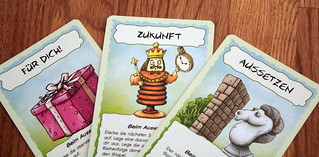| Strategy | Luck |
|---|---|
| Interaction | Components & Design |
| Complexity | Score |
What’s to discover? The Rules

Flee is another Fast Forward game, Friese’s own style of games you discover while you play. The first game in that style was Fabled Fruit. Last year there were three more games built around that mechanism: Fear, Fortress, and Flee. They are all card games, and in all of them the first rule is: Don’t Shuffle. You go through the deck in the order you got it in, and as you go you discover cards with new rules. That you don’t shuffle doesn’t mean the game is predetermined, however. The players’ decisions make a huge difference. Change one move and the butterfly effect changes the game.
What sets Flee apart from the other games in the series is that it’s a cooperative game. The common goal is to get to the bottom of the deck, drawing one card at a time. That’s what you do when it’s your turn. You draw a card. Then you play a card. Until you get to the last card.
If you hadn’t guessed it, it’s not that easy. One of the first cards you draw is The Monster. The Monster lies in front of one player. If the player with The Monster has to take a turn you all lose the game. The solution is not to tell that player to go make coffee and skip them every round. You get a variety of tools with the cards you draw. One is indeed to skip a player. Other cards change the turn order, or they make the monster move around. Always avoiding the same player would be the opposite of fun.
And as you go through the deck things become more complex. You discover other things to do, other ways to lose, different kinds of cards to get you out of a tight spot. And that’s all I’m going to tell. Find out for yourself.
Should we run from the game, or towards it? Our Verdict [minor spoilers end here]
Short answer: run towards this game. More details? Okay then. Flee is a brilliant use of the Fast Forward mechanism. Things introduced early in the game don’t become obsolete, but as you pile more and more different things on top the game becomes more tense, more dangerous. The decisions you have to make become more complex.

At the same time, though, Flee always remains a super quick game. You’ll want to discuss with your fellow players what to do on your turn, how they can follow up on it, and when to use some of the shared resources you discover. Whoops, I guess that was a tiny, little spoiler, after all. Ultimately, you always play one card on your turn. So even with more rules piled on, you never wait long for your next turn.
Just always keep in mind that Flee is a game of luck as well. You always make your decision in ignorance of one very important fact: what card the next player will draw. You will find yourself thinking that you would obviously have done things differently if you had known that sort of card even exists. But that, too, is part of the game. When The Monster gets you you don’t sort the cards and start from scratch. You shuffle the cards, put them back on the deck and keep going. A certain kind of player might be frustrated when that happens. You can’t have full control in Flee. You have to roll with the punches, dust yourself off and keep going. That’s how the game is made, and that’s the mindset to enjoy it. It’s not about winning without any setbacks, it’s about the joy of exploration.






